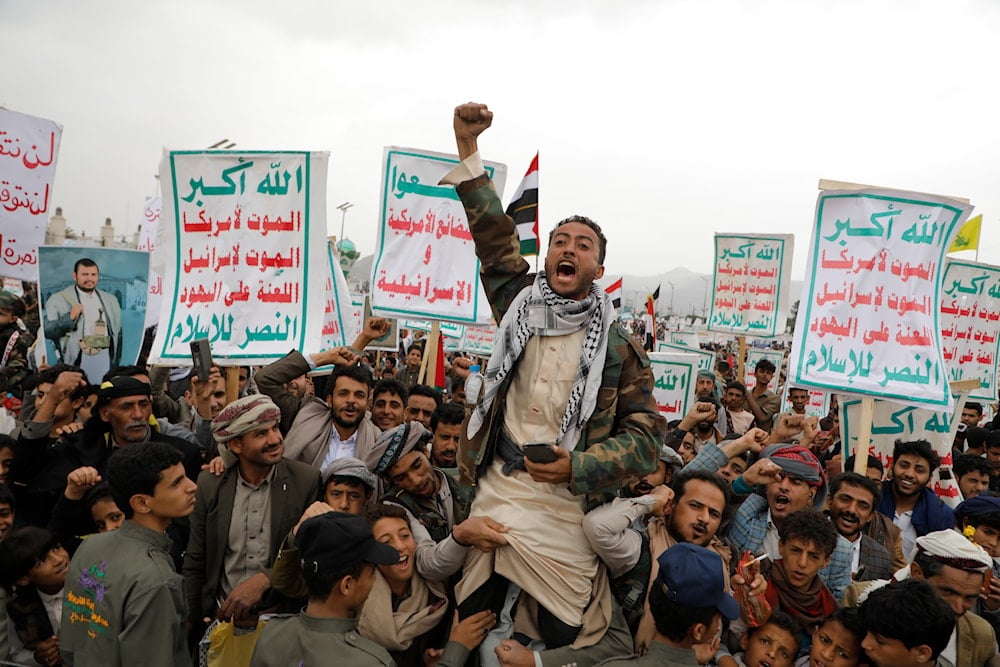Israeli aggression on Yemen won't deter YAF, only affects civilians
It will probably take a lot of money and effort to rebuild those facilities, which will affect essential living needs.
-

Yemenis attend a rally against the US and "Israel" in Sanaa, Yemen, on Friday, July 19, 2024. (AP)
Yemeni academics and former US officials who follow the Yemeni situation, according to The New York Times, have maintained that "Israel's" bombing of a crucial port in Yemen is not likely to stop the Yemeni Armed Forces from launching more strikes but would instead make life in the country more difficult.
The primary route for food, fuel, and humanitarian supplies to reach the underprivileged northern Yemen region, home to over 20 million people, was damaged by the Israeli strike on the Hodeidah port, The New York Times reported.
Just yesterday, Yemeni Ansar Allah leader Sayyed Abdul-Malik Badreddine al-Houthi said that the Israeli occupation chose its targets in Hodeidah with the deliberate intent of crippling Yemen's economy.
Addressing the people of Yemen, Sayyed al-Houthi emphasized that these attacks were not random but part of a calculated strategy to undermine the economic stability of the country.
Meanwhile, the Israeli occupation army spokesperson, Daniel Hagari, stated that the bombardment was conducted to halt Yemeni operations, adding that "dual-use" targets, such as electricity infrastructure, had been attacked.
Adam Clements, a retired US Army attaché for Yemen, said “The target of the strike does more to hurt the average Yemeni" than Ansar Allah's ability to launch attacks on the Red Sea or "Israel".
Some experts even claim that the Israeli strikes would elevate the Yemeni Armed Forces' status and strengthen their strikes against "Israel".
On June 20, Israeli occupation forces launched a series of airstrikes targeting the Ras Khathib power station in #Hodeidah, igniting oil storage facilities.
— Al Mayadeen English (@MayadeenEnglish) July 21, 2024
The brutal Israeli attack killed three Yemenis and wounded 87 others, many with severe burns, according to the Health… pic.twitter.com/wy5r2pe5BW
On X, Mohammed Abdul Salam, a spokesperson for the YAF, stated that "Israel's" aim to "intensify the people's suffering" was demonstrated by its bombardment of energy infrastructure.
Read next: What the West needs to know about Yemen's Ansar Allah
Yemenis living in the north depend on the port of Hodeidah as a crucial piece of infrastructure for supplies, food imports, and other goods.
It will probably take a lot of money and effort to rebuild those facilities, according to Mohammed Albasha, a senior Middle East analyst at the research firm Navanti Group. "Severe fuel shortages throughout northern Yemen," he projected, may have an adverse effect on necessities, such as hospital diesel generators.
Israeli security officials claimed in an internal memo written by military officials and obtained by The New York Times that the port was a "legitimate military target" and that the YAF controlled the majority of humanitarian aid arriving there.
They claim that aid should be diverted from Hodeidah to the port of Aden in the south by the international community.
According to Yemeni research fellow Farea Al-Muslimi of Chatham House, a London-based research organization, Israeli bombardment "will not have a significant impact on the Houthis ballistic weapons or drone capabilities" as more is anticipated by the YAF in retaliation against "Israel" and potentially against American allies in the Gulf, such as Bahrain and the United Arab Emirates.
Like other Yemeni academics, he drew comparisons between the strategy and the Israeli military's effort to destroy Hamas in Gaza: "burn the forest to hope to kill the snake."
Yesterday, UN Secretary-General Antonio Guterres expressed deep concern about Israeli airstrikes targeting the port of Hodeidah in Yemen.
In a statement released by the UN secretary general's spokesperson, Guterres urged all parties to avoid actions that could harm civilians and damage essential infrastructure.
"Initial reports indicate a number of fatalities and over 80 people injured in this attack, and that there has been considerable damage to civilian infrastructure. The Secretary-General calls on all concerned to avoid attacks that could harm civilians and damage civilian infrastructure," he stressed.
Back in March, the leader of the Yemeni Ansar Allah movement Sayyed Abdul-Malik al-Houthi stated that the nine-year ongoing war on Yemen has led to the martyrdom and injury of more than 50,000 civilians, most of them children and women, in addition to the martyred fighters.
Regarding the losses suffered by the war coalition, he said that the number of killed and wounded from all formations and divisions of the aggression armies and mercenaries reached 282,879.
He also pointed out that the war on the Yemeni people was not limited to military attacks. He noted that the aggression coalition led by the Saudis also imposed a siege, which led to starvation used as a tool to attempt to subdue the nation, and resorted to conspiracies against the national currency and banks, aimed to undermine the country's economy.
Additionally, he mentioned that the coalition destroyed 427 hospitals and medical facilities, in addition to killing a large number of medical staff, despite the limited health services in Yemen.
He added that the aggression targeted 354 power stations and generators, as well as 7,940 roads and bridges, killing large numbers of citizens. Moreover, 647 communication networks and stations and 3,332 water tanks and networks were targeted.
Read more: MintPress: How US-corporate media pushes for war in Yemen

 5 Min Read
5 Min Read








